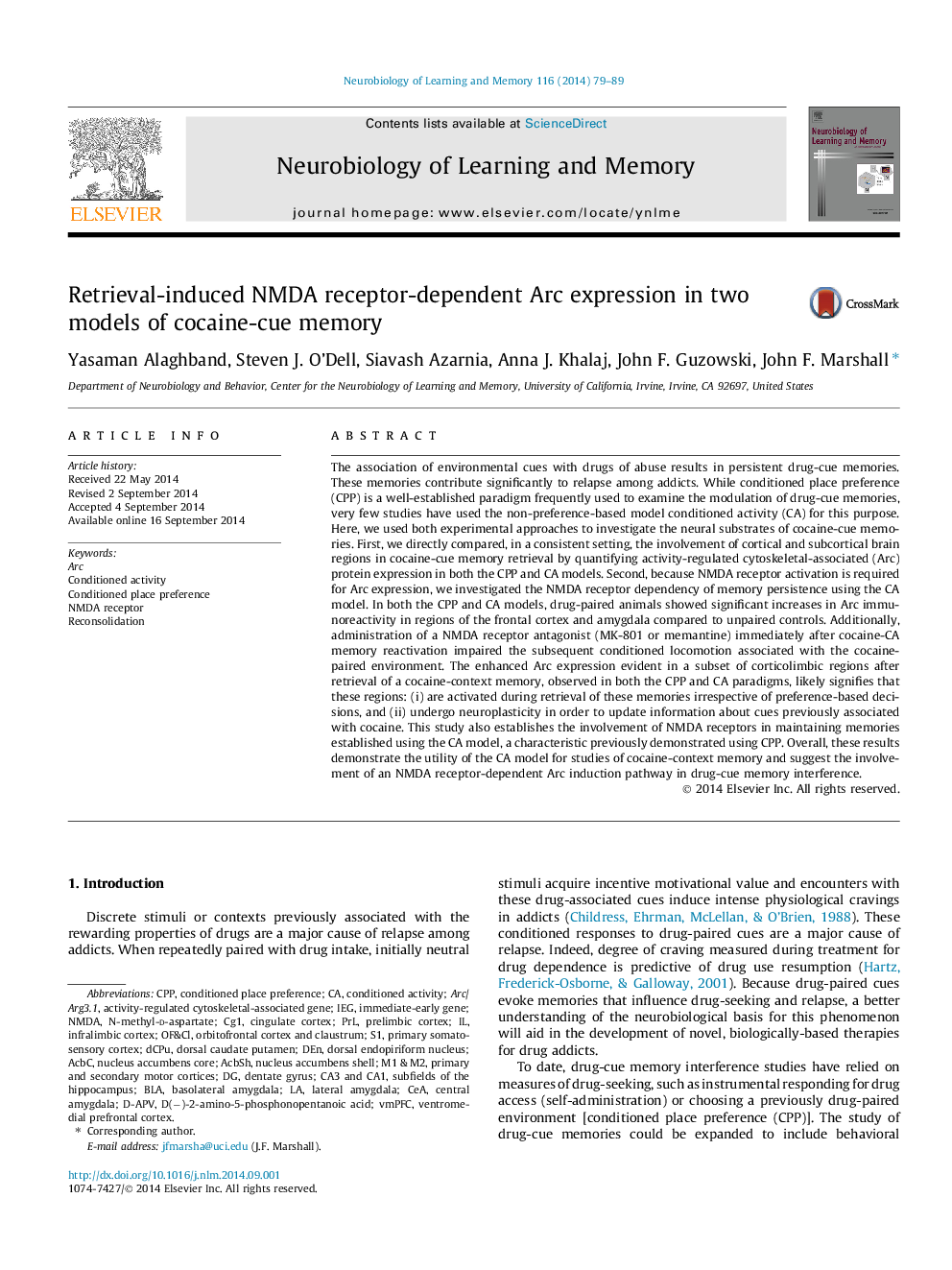| کد مقاله | کد نشریه | سال انتشار | مقاله انگلیسی | نسخه تمام متن |
|---|---|---|---|---|
| 7299891 | 1475159 | 2014 | 11 صفحه PDF | دانلود رایگان |
عنوان انگلیسی مقاله ISI
Retrieval-induced NMDA receptor-dependent Arc expression in two models of cocaine-cue memory
دانلود مقاله + سفارش ترجمه
دانلود مقاله ISI انگلیسی
رایگان برای ایرانیان
کلمات کلیدی
BLAD-APVAcbShIEGvmPFCPRLCg1N-methyl-d-aspartateCPPDenNMDAACBCbasolateral amygdala - amygdala basolateralArc/Arg3.1 - Arc / Arg3.1CeA - CEAD(−)-2-amino-5-phosphonopentanoic acid - D (-) - 2-amino-5-phosphonopentanoic acidNMDA receptor - NMDA گیرندهlateral amygdala - آمیگدال جانبیCentral amygdala - آمیگدالای مرکزیReconsolidation - بازسازیconditioned place preference - ترجیح محل موظف استdentate gyrus - شکنج دندانه دارinfralimbic cortex - قشر infralimbicprimary somatosensory cortex - قشر اسموتیسنسوری اولیهprelimbic cortex - قشر پیش از قاعدگیArc - قوسnucleus accumbens core - هسته accumbens هستهnucleus accumbens shell - هسته accumbens پوستهdorsal endopiriform nucleus - هسته ی endopiriform پشتیImmediate-early gene - ژن سریع و سریعventromedial prefrontal cortex - کورتکس prefrontal ventromedialcingulate cortex - کورتکس کانگولت
موضوعات مرتبط
علوم زیستی و بیوفناوری
علم عصب شناسی
علوم اعصاب رفتاری
پیش نمایش صفحه اول مقاله

چکیده انگلیسی
The association of environmental cues with drugs of abuse results in persistent drug-cue memories. These memories contribute significantly to relapse among addicts. While conditioned place preference (CPP) is a well-established paradigm frequently used to examine the modulation of drug-cue memories, very few studies have used the non-preference-based model conditioned activity (CA) for this purpose. Here, we used both experimental approaches to investigate the neural substrates of cocaine-cue memories. First, we directly compared, in a consistent setting, the involvement of cortical and subcortical brain regions in cocaine-cue memory retrieval by quantifying activity-regulated cytoskeletal-associated (Arc) protein expression in both the CPP and CA models. Second, because NMDA receptor activation is required for Arc expression, we investigated the NMDA receptor dependency of memory persistence using the CA model. In both the CPP and CA models, drug-paired animals showed significant increases in Arc immunoreactivity in regions of the frontal cortex and amygdala compared to unpaired controls. Additionally, administration of a NMDA receptor antagonist (MK-801 or memantine) immediately after cocaine-CA memory reactivation impaired the subsequent conditioned locomotion associated with the cocaine-paired environment. The enhanced Arc expression evident in a subset of corticolimbic regions after retrieval of a cocaine-context memory, observed in both the CPP and CA paradigms, likely signifies that these regions: (i) are activated during retrieval of these memories irrespective of preference-based decisions, and (ii) undergo neuroplasticity in order to update information about cues previously associated with cocaine. This study also establishes the involvement of NMDA receptors in maintaining memories established using the CA model, a characteristic previously demonstrated using CPP. Overall, these results demonstrate the utility of the CA model for studies of cocaine-context memory and suggest the involvement of an NMDA receptor-dependent Arc induction pathway in drug-cue memory interference.
ناشر
Database: Elsevier - ScienceDirect (ساینس دایرکت)
Journal: Neurobiology of Learning and Memory - Volume 116, December 2014, Pages 79-89
Journal: Neurobiology of Learning and Memory - Volume 116, December 2014, Pages 79-89
نویسندگان
Yasaman Alaghband, Steven J. O'Dell, Siavash Azarnia, Anna J. Khalaj, John F. Guzowski, John F. Marshall,